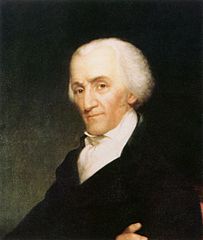Elbridge Gerry was a merchant from Massachusetts who joined the fight for independence by providing supplies to the Continental army and attending the Second Continental Congress, eventually signing his name to the Declaration of Independence.
Early Life & Education
Elbridge Gerry was born on July 17, 1744 to Thomas and Elizabeth Gerry. He was one of eleven children. Tragically, however, only 5 of these children survived to adulthood.
Young Elbridge made it into Harvard College at the age of 14. He graduated in 1765, and entered his father’s merchant business. Within a decade, the Gerrys were some of the wealthiest merchants in Massachusetts.
Politics During War

Elbridge Gerry, by James Bogle
Public domain image.
Gerry’s political career really kicked off in 1774. He was elected to represent Massachusetts in the First Continental Congress in September, but turned this opportunity down to grieve for his recently-diseased father. However, in October, he was elected to the Massachusetts Provincial Congress, and, this time, he accepted.
Gerry served a leading role in supplying the Continental army, using his contacts and sways as both merchant and politician through the early battles such as the Battle of Lexington and Concord and the Siege of Boston.
He went on to serve in the Second Continental Congress in 1776 where he stayed until 1780. During this time he was influential in bringing about the creation of the Declaration of Independence.
Possibly his most defining moment came when his hard work paid off, and the Declaration of Independence was passed. Elbridge Gerry was one of the 56 men who had the honor and privilege of signing this great document.
Gerry’s political views favored a less centralized government. He advocated a more civilian-controlled military. He also disliked the idea of political parties which, at the time, were mainly Federalists versus Democratic-Republican.
Politics After War
It was not until late in his career that he declared himself a Democratic-Republican due to a dislike for the strong, centralized government that he saw the Federalists pushing for.
He continued his political career, and in 1788 was elected to the House of Representatives, where he served for two terms.
After four unsuccessful years of running, Gerry finally became the Governor of Massachusetts in 1810. He held this position for a second term in 1811, but lost out in 1812.
After his failure for election early in the year in 1812, Elbridge went to James Madison who took him on as vice-presidential running mate for the 1812 presidential election. Madison, who was the president at the time, easily won reelection, making Gerry vice-president.
Late in the year of 1814, Elbridge Gerry fell deathly ill. He passed not long after returning to his boarding house.
Legacy
The most common remembrance of Elbridge Gerry is the process of “gerrymandering”, in which the voting districts are redefined in order to create the maximum impact of supportive voters. The less people per voting district, the more weight each vote holds; therefore, the more supportive districts are created, the more chance of winning an election.
Founding Father Patrick Henry was the first to try this tactic, but when one of Gerry’s newly created districts resembled a salamander, the name “gerrymander” stuck permanently.


